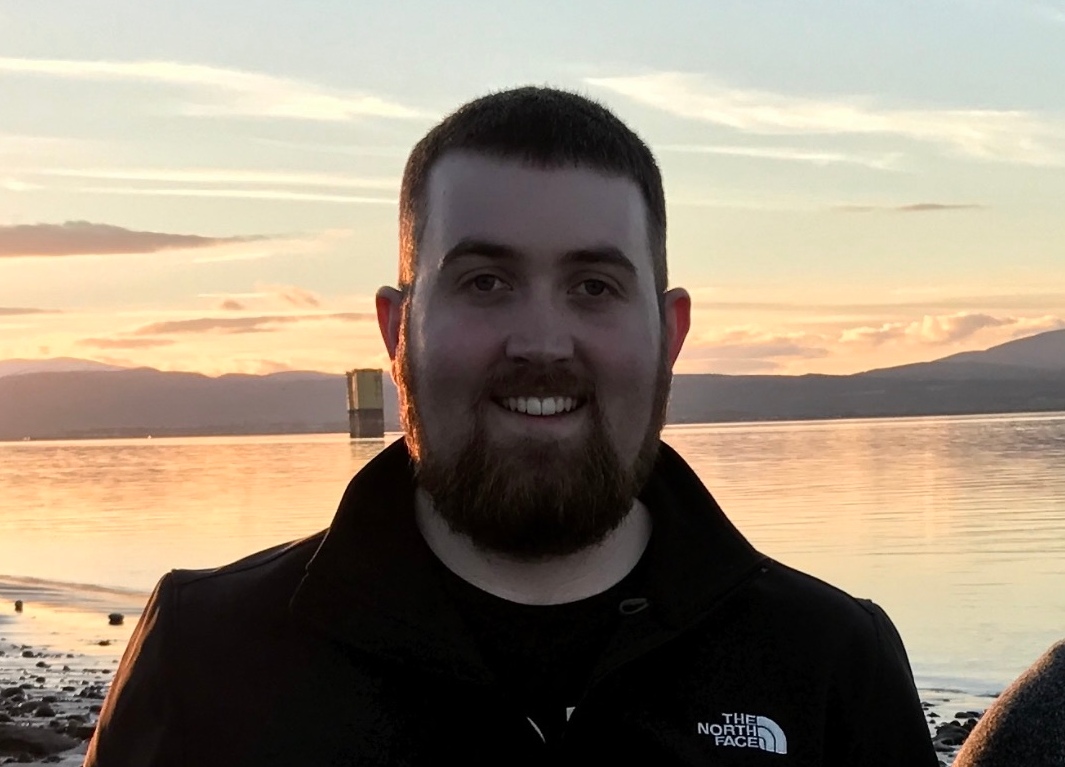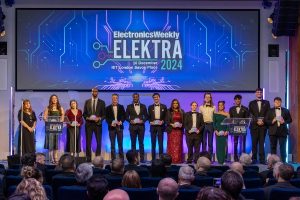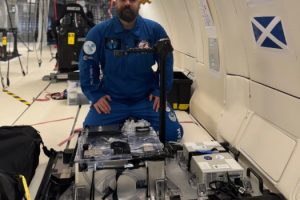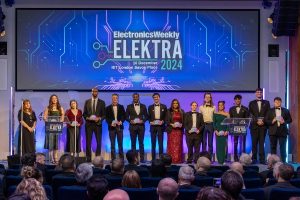Continuing our series on the latest EW BrightSparks of 2024, we profile Philip Heptonstall, a UKESF Scholar, a student at Edinburgh University and Co-Op Intern at Advanced Micro Devices (AMD).
Achievements
Philip has been studying for a Master’s in Engineering at Edinburgh University, on an Electronics and Computer Science course. He is also been working as an Intern at AMD.
Among Philip’s achievements at AMD, he told us, was contributing to a systems-level understanding of Forward Error Correction (FEC) in high-speed interconnects.
For example, he developed a modelling tool to predict performance of FEC in such interconnects, enabling rapid iteration of solutions. He was fostering an academic partnership that will improve the skill set of graduates as well as AMD employees.
He explained further, highlighting how AI is driving massive compute demands. These demands are fulfilled by datacenters, were large numbers of servers are connected via an interconnect…
“Scaling the interconnect helps to scale datacenters. AMD is championing several open standards for high-speed interconnect, such as Ultra Accelerator Link (UALink) and Ultra Ethernet Consortium (UEC). A challenge enabling higher data rate interconnects is that the copper cable connection significantly influences the data going through it – necessitating complex techniques on the transceiver to recover the data. Despite these techniques, there are still several errors that pass through. These errors are handled by encoding the data packet that goes through the cable with a FEC code, which adds redundancy to enable error correction at the receiver. My focus was on investigating FEC solutions for high-speed (224 and 448 Gbps links) communication.”
Traditionally, the team in AMD consists of Silicon designers/architects that develop FEC solutions for customers using existing specifications, Philip explained.
As mentioned, his contribution was in providing a system-level understanding of FEC.
“Here I identified and described the use cases for high-speed interconnects, the approaches taken to achieve high-speed interconnects, and how that resulted in the need for FEC. I described the requirements imposed by the system on the FEC, e.g. techniques used to recover the data on the cable introduce burst errors that can be detrimental to FEC performance. These effects must be modelled to get an accurate picture of FEC performance – at the time, AMD only had simulation-based models that took days to produce results, impacting on our ability to rapidly iterate on solutions. I developed an analytical model that produced results in minutes, which showed a good consistency with simulation – sufficient to make high-level decisions.”
Another significant contribution made by Philip was in helping promote the upskilling of AMD employees and also new college graduates. This involved using and experiencing modern Application Specific Integrated Circuit (ASIC) design flows.
“Addressing this, I organised initial meetings between AMD and [Edinburgh] University with the goal of tailoring a course to provide an overview and practical experience with the design flow. The resulting course is expected to be introduced next semester and will significantly bolster the expertise of new graduates. In addition, the course might be offered internally to AMD.”
 Electronics Industry Viewpoint
Electronics Industry ViewpointAlly Macleod, UHI North, West and Hebrides and the IET, also shared his viewpoint on Philip’s entry.
He highlighted Philips work on a course for providing an overview and experience of ASIC design flows, for example.
“The above achievement really stands out for me,” he told us. “It is vital in industry to identify gaps in knowledge for the workforce. This in turn helps drive innovation and improves an employees ability to problem solve.”
Community
Philip has also been widely involved in STEM and community outreach work.
His community contributions are in promoting STEM learning among primary school students, he told us. He has also been helping develop core skills among his peers and in organising events to bring people together socially.
For example, he volunteered at two local primary schools to run an electronics workshop activity with over a hundred participants.
“We introduced students to the basics of electronics and motivated them by providing kits that let them build their own circuits. During the activity, I helped students understand the nature of the circuits they were building, excited them about the applications, and helped them to address any issues they were facing. To make it interesting, I had to constantly think of how theories relate to better-known phenomenon – some examples were that the circuits had to be a closed systems that acted like water pipes. We chose to build circuits that mirrored the behaviour of familiar applications like streetlamps or fans. This gave all of us new insight into how these are designed and built, which was a big surprise to all.”
For Edinburgh University Formula Student (EUFS), Philip led the Controls Systems sub-team for two years. This involved developing the team from scratch, to be able to manage all autonomous interfaces and sensors.
“During that time, I oversaw the recruitment, training and projects of multiple younger students. Their activities provided them with key skills such as project management, systems thinking. These were complemented with experience in working within a team, and with practical electronics.”
Additionally, he undertook many tutoring roles within the university, acting as a role model to younger students. For instance, he provided insight into his course, how it fit into the industry, and he offered advice on development and career choices.
He has also promoted the UK Electronics Skills Foundation (UKESF), he told us. This was among university students in the University of Strathclyde at a careers fair.
“I was one of several volunteers manning the stall with the goal of promoting the UKESF scholarship scheme. The scheme introduces employers to students, enabling students to develop their technical ability in a practical setting. In addition, I emphasised on the opportunities for personal development and outreach brought by UKESF. Having seen the benefits of the Scholarship Scheme first-hand, I was pleased to feed back and encourage other engineers to apply.”
Finally, in 2022 and 2023, he became aware that several year groups had struggled to meet others during COVID and had little practical experience in lab work. To address the social aspect, he related, he organised an EEE Ball in 2022 resulting in over one hundred participants. And, during his time as Academic Secretary for the Electronics and Electrical (EEE) society in 2022-2023, he organised multiple lab-based workshops. For example, to teach soldering skills and introduce microcontrollers. Hearteningly, he received great feedback and had over 50 participants.
Congratulations to Philip Heptonstall!
See also: Elektra Awards 2024 – The Winners
 Electronics Weekly
Electronics Weekly



